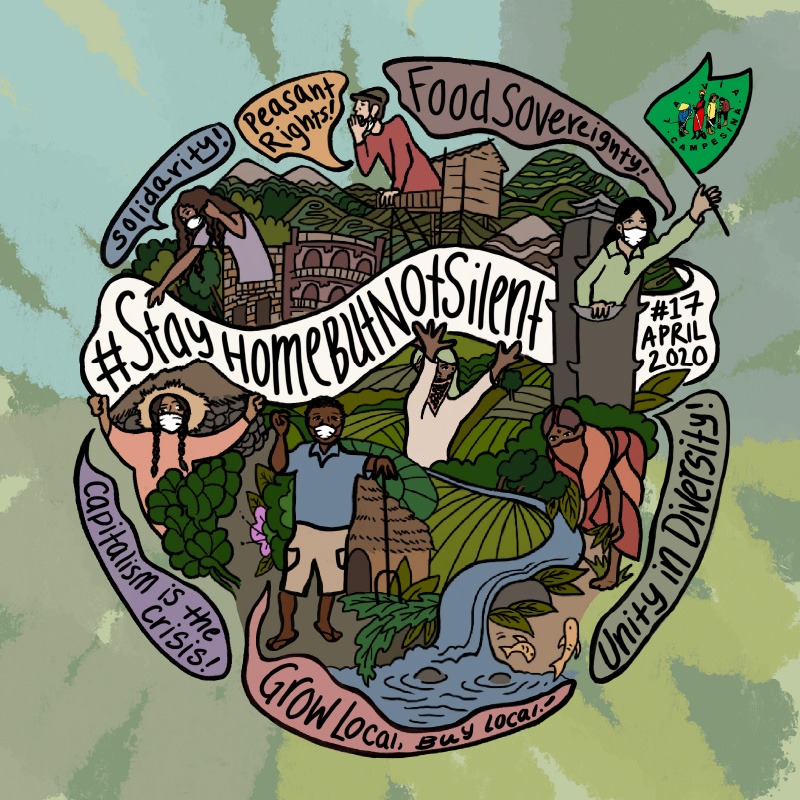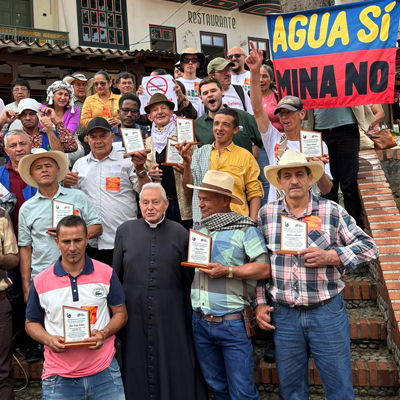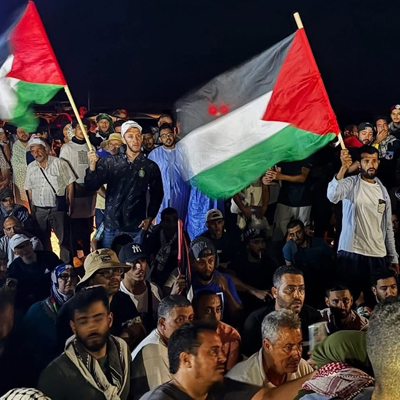The peasant struggle amid the COVID-19 pandemic
On the International Day of Peasants' Struggle, organizations promote Food Sovereignty as a solution in the world we want to build
 La Vía Campesina
La Vía Campesina
April 17, International Day of Peasants’ Struggle, is a special day celebrated by rural organizations around the world, usually with demonstrations, conferences, demands addressed to governments, and other activities. But of course, this year, the COVID-19 pandemic is severely limiting the room for action.
For this reason, the international peasant movement La Vía Campesina, which gathers local rural organizations at the global level, is calling people to “stay at home, but not silent” and to demonstrate in creative ways their demands for governments to respect the rights of peasant workers amid the crisis.
The date of April 17 was chosen as International Day of Peasants’ Struggle in commemoration of the “Massacre of Carajas”. In 1996, around 1500 men and women from the Landless Rural Workers Movement of Brazil (MST) blocked road BR 150 in Eldorado dos Carajas municipality, Pará State, to push for agrarian reform, the main demand of the MST since it was founded in 1984. The Brazilian military police attacked the demonstrators, murdering 19 landless peasants and injuring 69. Three more died a few days later. Since then, La Vía Campesina commemorates this date and celebrates peasant struggles.
“Today we celebrate those who have given up their lives in the struggle for Food Sovereignty, for justice, for human rights and for a better world. But this year, the day takes on a new meaning. We are facing an immense COVID-19 crisis which is already taking a shocking toll on human life, but which is also deepening all the existing huge inequalities in our system, including on class, wealth, nutrition, health, race and gender,” highlighted Kirtana Chandrasekaran, co-coordinator of the Food Sovereignty Program at Friends of the Earth International.
As stated by this environmental federation, the dire consequences of the coronavirus are the result of the ever increasing concentration of wealth and the imposition of a neoliberal doctrine that sacrifices the preservation of life. Kirtana added: “In this crisis today we can see that the way we produce, distribute and consume our food has a huge part to play in why we are facing this COVID crisis, and also how equipped countries will be to deal with it, especially to prevent more deaths from starvation and destitution.”
As defined by La Vía Campesina, Food Sovereignty is the right of peoples, countries and states to define their own agricultural and food policies. It includes the rights of farmers and peasants to produce food, and the right of consumers to be able to decide what they consume, and how and by whom it is produced.
“Food Sovereignty will help us build a system and future that is more resilient. We call for ecological food production that is based on the right to food, rather than food as a commodity for profit,” said Kirtana.
Meanwhile, peasant farmer and leader Pramesh Pokharel, from La Vía Campesina and ANPFA Nepal, stated that “we are staying at home and united to fight against the pandemic but committed to feed the world, so that everyone gets healthy and appropriate food, and no one will die from hunger.”
He stressed the role of small-scale food producers, peasants and landless rural workers who produce more than 70 % of our food and are essentially the ones who are feeding the world. “Even in a time of crisis, our main task, our main role is to produce the food, because most of the world is under lockdown and it is important that everyone in the world has the right to food”, he added.
La Vía Campesina is calling for mobilization around 17 April 2020, urging its members and allies to “stay home but not silent” and to denounce the multiple killings and evictions of peasants, as well as the economic blockades. It has asked its communities to highlight and expose the continued criminalization of peasant struggles, and the precarious conditions of rural economies.
“We are asking the government and the state to change public policies and move towards localized food systems. We are asking for Food Sovereignty. Our strong message is that the peasant system has helped not only to supply food to the people, and feed the people, but also deal with the crisis. That’s why it’s the right time to move towards localized food systems and food sovereignty,” concluded Pramesh.
For more information, read La Vía Campesina’s press release or follow the #StayHomeButNotSilent campaign on social media.





